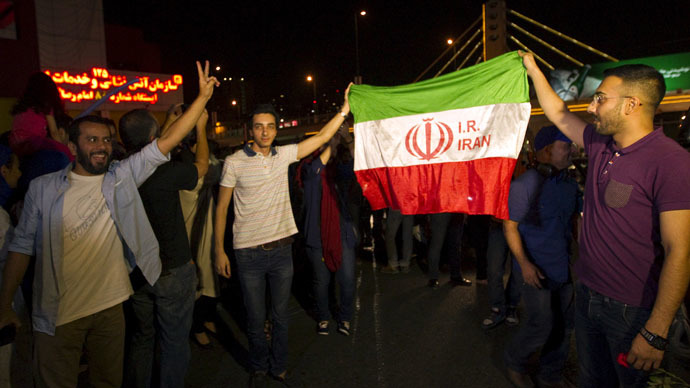Skeptics, snapbacks & Netanyahu: How Iran nuclear deal could still be derailed

Triumphal tags of “comprehensive” and “historic” used by US and Iranian leaders to describe the Vienna treaty on Iran’s nuclear program have not impressed those cynical of the deal’s actual implementation. Here is why it may be too early to celebrate.
Firstly, the US President Barack Obama will only have a 60-day window to convince Congress, where many Republicans are hostile to the agreement, and even Democrats are lukewarm about the proposal.
The document stipulates that Iran must reduce its stockpile of low enriched uranium by 98 percent, shut down two-thirds of its centrifuges, and open its sites to international observers for the next 25 years. However, it leaves all the advanced nuclear facilities in place – giving those critics who accuse Iran of masterminding a nuclear weapon program, enough grounds to reject the deal.
“Instead of stopping the spread of nuclear weapons in the Middle East, this deal is likely to fuel a nuclear arms race around the world,” John Boehner, House Speaker, said within hours of Obama’s early-morning White House announcement.
We’ll do everything we can to stop a bad deal with #Iran: http://t.co/Qch3T4AXPe#IranDeal
— Speaker John Boehner (@SpeakerBoehner) July 14, 2015
“I am confident that this deal will meet the national security needs of the United States and our allies, so I will veto any legislation that prevents the successful implementation of this deal,” Obama warned his Capitol Hill critics.
But with the 2016 election in view, Republican presidential nomination front runner Jeb Bush stressed he wouldn’t uphold this part of Obama’s legacy.
READ MORE: Spoiler alert: How US politics could wreck the Iran deal
“This isn’t diplomacy – it is appeasement,” said Bush in a statement. “Shame on the Obama administration for agreeing to a deal that empowers an evil Iranian regime to carry out its threat to ‘wipe Israel off the map’ and bring ‘death to America’.”
The nuclear agreement with Iran is a dangerous, deeply flawed, and short sighted deal. My full statement: http://t.co/sSftOAkyAM
— Jeb Bush (@JebBush) July 14, 2015
While possibly appealing to the Republican heartlands he needs to win the primaries, Bush promised that “as President” he would keep “all options on the table, including military force, to topple the terrorist Iranian regime.”
The favorite to win the Democratic nomination, Hilary Clinton, sounded more positive, after reportedly telling fellow party members that Tuesday’s agreement is “not perfect—no deal is perfect—but it’s better than the alternatives.”
READ MORE: Verification, not trust behind nuclear deal – Obama
At the same time, she later stressed that “as president, I would use every tool in our arsenal to compel rigorous Iranian compliance,” and would “never allow” Iran to acquire a nuclear weapon.
Conversely, while the front pages in the Iranian state-owned media celebrated the agreement, reached after 20 months of talks, analysts suspected that some of Iran’s shadow brokers remained unimpressed, or fearful that a failure to develop nuclear weapons opens them to US-backed “regime change.”
“That part of Iran’s leadership needs the United States as an enemy. A nuclear deal—and, more importantly, the lifting of some economic sanctions—would give President Hassan Rouhani a boost and may buy him some freedom to pursue his domestic and foreign-policy reforms. But Khamenei and his conservative allies will still maintain a tight grip on Iran’s economy, military, and security forces,” Alireza Nader, a senior international policy analyst, told Newsweek.
READ MORE: #IranDeal as seen online: New horizons or impending Apocalypse?
Some believed that reaction in Tehran would hinge on whether sanctions relief after ten years of embargos would bring tangible gains to ordinary Iranians.
“Imagine if the economic benefits don’t come. Imagine if sanctions are suspended, but Obama or his successor does not follow through; then it will be a disaster,” Tehran University academic Foad Ezadi told the Guardian.
Quite apart from containing several grey areas, despite White House assurances that all ways to a nuclear bomb have been cut off for Iran, the agreement is fragile.
The mechanism for punishing Iran for any violations is unusually efficient for such a high-level treaty. If Tehran fails to comply with any of the statutes of the agreement, a majority vote in a panel of Britain, China, France, Germany, Russia, the United States, the European Union and Iran, can “snap back” the sanctions, and effectively suspend the treaty within 65 days. With four allies in Western Europe (including the EU), Washington is likely to have a majority bloc vote in any such decision.
While winning support for the deal at home might be tough, the Obama government would also have to resolve the issue with its major allies in the Middle East, Israel and Saudi Arabia.
READ MORE: 'Stunning historical mistake': Netanyahu says Israel is not bound by Iran nuclear deal
Israeli Prime Minister Benjamin Netanyahu, who has been fiercely lobbying against the signing of any agreement with Iran, has already called the deal a “historic mistake for the world.”
Netanyahu has been playing the card of “Iranian bomb” combined with that of the special US-Israeli relationship in an attempt to persuade US lawmakers that any relief of sanctions on Iran would potentially cause a threat to Israel.
For Washington, which has long referred to Tehran as a threat to security in the region – and, potentially, a national security threat – changing its tune on Iran with a new deal, which would eventually lead to lifting of arms embargo, could be seen as an awkward move.
Notably, Iran is still on the US State Department’s list of “state sponsors of terrorism,” along with the likes of Sudan and Syria.
The Israeli lobby in the US has already capitalized on this issue, with the American Israel Public Affairs Committee (AIPAC) stressing it is “deeply concerned” that the deal “would fail to block Iran’s path to a nuclear weapon and further entrench and empower the leading state sponsor of terror.”
LISTEN MORE:












